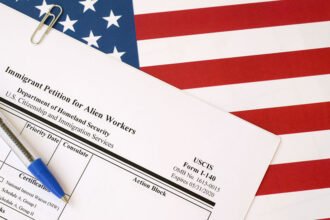Form DS-160 is the cornerstone of the U.S. nonimmigrant visa application process. Whether you’re applying for a tourist visa (B-2), business visa (B-1), student visa (F-1), or work visa (H-1B), completing the DS-160 accurately is crucial. This standardized online form collects your personal details, travel plans, employment history, and background information, which U.S. consular officers will carefully review during your visa interview. A single mistake can result in delays or denials, making attention to detail essential. This guide provides a detailed walkthrough of the DS-160 form, explores common mistakes, explains supporting documents, and offers practical tips to ensure a successful visa application experience.
What is Form DS-160?
Form DS-160, officially titled the Online Nonimmigrant Visa Application, is an online form that must be submitted by all nonimmigrant visa applicants to the U.S. It collects necessary personal, travel, and background information. This data is used by the U.S. Department of State to assess eligibility for various types of nonimmigrant visas.
This form is the first formal step in applying for a temporary U.S. visa. The details you provide will be reviewed by consular officers during your visa interview.
Who Needs to Complete Form DS-160?
All individuals seeking to travel to the United States temporarily must complete Form DS-160. This includes people applying for:
- B-1/B-2 (Business/Tourist)
- F-1 (Academic Student)
- J-1 (Exchange Visitor)
- H-1B (Specialty Occupation Worker)
- O, P, Q (Various professional or cultural exchange categories)
- K (Fiancé(e) of a U.S. citizen)
Children and other dependents also need separate DS-160 forms.
Required Documents and Information
Before starting the DS-160, gather the following:
- A valid passport with at least six months of validity beyond your intended stay
- Travel itinerary (if applicable)
- U.S. contact details, such as the person or organization you will visit
- Employment and educational history
- Previous U.S. visa information
- Social media identifiers (as required since 2019)
- Digital photo that meets U.S. visa standards
Having these documents ready before beginning the form will save time and ensure consistency.
Accessing and Starting the DS-160
Visit the Consular Electronic Application Center (CEAC) at ceac.state.gov. Choose the U.S. embassy or consulate where you’ll apply and click “Start an Application.”
The system will generate an Application ID. Write this down along with the answer to your chosen security question so you can return to your form later if needed. This is crucial, as the DS-160 session can time out for security reasons. Saving your progress allows you to revisit the form without losing valuable information. Always double-check that the embassy or consulate selected matches your interview location to avoid complications later in the process.
Completing Form DS-160: Section-by-Section Guide
Personal Information
Provide your full name, date of birth, nationality, marital status, and identification numbers exactly as they appear on your passport. Any discrepancies can lead to delays or denial.
Travel Information
Specify the purpose of your trip, intended length of stay, planned arrival date, and the address where you will stay in the U.S. If you’re applying for a tourist visa, a hotel booking or family member’s address is acceptable.
Travel Companions
Include names and relationships of individuals traveling with you. If you’re part of a tour group or business delegation, list relevant details.
Previous U.S. Travel
Document any past visits to the United States, visa applications, and denials. Be honest and provide as much detail as possible.
U.S. Point of Contact
This can be a person or organization. If you don’t know anyone, you may use your hotel or host institution as the contact.
Family Information
Include parents’ names and birth dates, spouse information (if applicable), and whether any immediate relatives reside in the U.S.
Employment and Education
List your current and previous jobs, educational institutions, job duties, and addresses. Students should provide school transcripts and enrollment letters during their interview.
Security and Background
You must answer questions related to communicable diseases, criminal history, drug use, espionage, terrorism, immigration violations, and more. Misrepresentation can permanently bar you from the U.S.
Uploading a Digital Photo
You must upload a recent photo that meets the U.S. visa photo requirements. The photo should:
- Be in color
- Have a white background
- Show a full front view of the face
- Be 2×2 inches in size or 600×600 pixels (digital)
- Show a neutral expression
If the system rejects your photo, you’ll need to provide one at the embassy.
Reviewing and Submitting the Form
Once you’ve completed all sections:
- Review each answer carefully
- Sign electronically at the end of the form
- Submit the form
A confirmation page with a barcode will be generated. Print this page — it’s mandatory for your visa interview.
Next Steps After Submission
After submitting the DS-160:
- Pay the visa application fee (varies by country and visa type)
- Schedule an interview with the nearest U.S. embassy or consulate
- Prepare for the interview by organizing all supporting documents
Most embassies allow online interview scheduling. Be sure to check country-specific instructions.
Common Mistakes to Avoid
- Using a nickname instead of your legal name
- Skipping sections or entering placeholder text (like “N/A”) incorrectly
- Submitting the form with outdated or incorrect information
- Entering wrong passport numbers or birth dates
- Failing to save or print the confirmation page
If any errors are discovered after submission, you must complete a new DS-160.
Visa Interview Preparation
Bring these documents to your interview:
- Your passport
- The DS-160 confirmation page
- Visa fee receipt
- Appointment confirmation
- Supporting documents (e.g., job letters, school letters, financial proof, itinerary)
Dress appropriately, arrive early, and answer all questions honestly. The consular officer will evaluate your application and determine visa eligibility.
Conclusion
Filing Form DS-160 is a critical step in your journey to the United States. While the form may appear straightforward, any mistake or omission can delay or jeopardize your visa application. Taking the time to prepare accurate information, uploading the correct photo, and reviewing your entries thoroughly can significantly improve your chances of approval.
In 2025, with increased focus on background checks and transparency, the U.S. government emphasizes full disclosure and consistency. By following this guide, you’ll be well-equipped to complete your DS-160 and move confidently into the next stage of the visa process.



